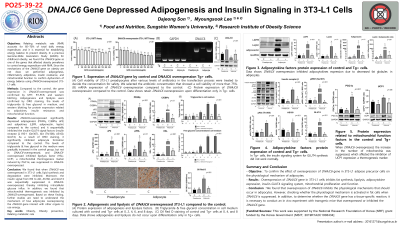Back

Objectives: Resting metabolic rate (RMR) accounts for 60-70% of total daily energy expenditure, and it is essential for establishing energy balance to prevent obesity. In a previous Genome-Wide Association Study (GWAS) for childhood obesity, we found the DNAJC6 gene as one of the genes that affected obesity prevalence to control energy expenditure with RMR. Since the mechanisms of the DNAJC6 gene on obesity are not clear, we performed adipogenesis, inflammatory adipokines, insulin resistance, and mitochondrial function to confirm dysfunction of energy balance using DNAJC6-overexpressed 3T3-L1 cells.
Methods: Compared to the control, the gene expression in DNAJC6-overexpressed was confirmed by MTT, RT-PCR, and western blotting. Adipogenesis and lipolysis were confirmed by ORO staining, the levels of triglyceride & free glycerol in medium, and western blotting for protein expression related to adipokines, insulin resistance, and mitochondrial function.
Results: DNAJC6-overexpressed significantly depressed adipogenesis (PPARγ, C/EBPα, aP2) and adipokines (LEPR, adiponectin, leptin) compared to the control, and it sequentially inhibited the insulin-GLUT4 signal factors (insulin receptor β, IRS-1, Akt (T308), AS160, GLUT4). As a result of ORO staining, it significantly inhibited adipocyte formation compared to the control. The levels of triglyceride & free glycerol in the medium were gradually increased in the control group, but not in DNAJC6-overexpressed, and DNAJC6-overexpressed inhibited lipolysis factor (HSL). UCP1, a mitochondrial thermogenesis marker induced by PGC1α, was suppressed in both groups.
Conclusions: We found that when DNAJC6 was overexpressed in 3T3-L1 cells, lipid synthesis and degradation were inhibited. Moreover, the insulin signal from IRS to Akt, AS160, and GLUT4 was sequentially suppressed in DNAJC6-overexpressed, thereby inhibiting intracellular glucose influx. In addition, we found that mitochondrial thermogenesis was inhibited by DNAJC6-overexpressed. Based on these findings, further studies are needed to understand the mechanism of how adipocytes overexpressing the DNAJC6 gene interact with other organs to use energy.
Funding Sources: This work was supported by the National Research Foundation of Korea grant funded by the Korea Government (MSIT;2019R1A2C1008434).
Obesity
(PO25-39-22) DNAJC6 Gene Depressed Adipogenesis and Insulin Signaling in 3T3-L1 Cells

- DS
Dajeong Son, Graduate student
– Student, Sungshin Women's University, Seoul, Seoul-t'ukpyolsi, Republic of Korea - ML
Myoungsook Lee, Professor
– Professor, Sungshin Women's University, seoul, Seoul-t'ukpyolsi, Republic of Korea
Presenting Author(s)
Co-Author(s)
Disclosure(s):
Dajeong Son, Graduate student: No relevant financial relationship(s) with ineligible companies to disclose.
Objectives: Resting metabolic rate (RMR) accounts for 60-70% of total daily energy expenditure, and it is essential for establishing energy balance to prevent obesity. In a previous Genome-Wide Association Study (GWAS) for childhood obesity, we found the DNAJC6 gene as one of the genes that affected obesity prevalence to control energy expenditure with RMR. Since the mechanisms of the DNAJC6 gene on obesity are not clear, we performed adipogenesis, inflammatory adipokines, insulin resistance, and mitochondrial function to confirm dysfunction of energy balance using DNAJC6-overexpressed 3T3-L1 cells.
Methods: Compared to the control, the gene expression in DNAJC6-overexpressed was confirmed by MTT, RT-PCR, and western blotting. Adipogenesis and lipolysis were confirmed by ORO staining, the levels of triglyceride & free glycerol in medium, and western blotting for protein expression related to adipokines, insulin resistance, and mitochondrial function.
Results: DNAJC6-overexpressed significantly depressed adipogenesis (PPARγ, C/EBPα, aP2) and adipokines (LEPR, adiponectin, leptin) compared to the control, and it sequentially inhibited the insulin-GLUT4 signal factors (insulin receptor β, IRS-1, Akt (T308), AS160, GLUT4). As a result of ORO staining, it significantly inhibited adipocyte formation compared to the control. The levels of triglyceride & free glycerol in the medium were gradually increased in the control group, but not in DNAJC6-overexpressed, and DNAJC6-overexpressed inhibited lipolysis factor (HSL). UCP1, a mitochondrial thermogenesis marker induced by PGC1α, was suppressed in both groups.
Conclusions: We found that when DNAJC6 was overexpressed in 3T3-L1 cells, lipid synthesis and degradation were inhibited. Moreover, the insulin signal from IRS to Akt, AS160, and GLUT4 was sequentially suppressed in DNAJC6-overexpressed, thereby inhibiting intracellular glucose influx. In addition, we found that mitochondrial thermogenesis was inhibited by DNAJC6-overexpressed. Based on these findings, further studies are needed to understand the mechanism of how adipocytes overexpressing the DNAJC6 gene interact with other organs to use energy.
Funding Sources: This work was supported by the National Research Foundation of Korea grant funded by the Korea Government (MSIT;2019R1A2C1008434).

.png)
